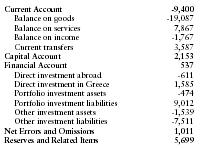Greece - Balance of payments
Because it imports more than twice the value of its exports, Greece has registered chronic annual deficits in its balance of payments. The major contributors to Greece's foreign exchange earnings are tourism, shipping services, and remittances from Greek workers abroad. Greece's relatively small industrial base and lack of substantial investment since the mid-1990s limited the country's export potential. Greece's productive base expanded in 1999 and 2000, however, in part due to a thriving stock exchange, and low interest rates. A devaluation of the drachma in 1998 and its inclusion in the euro zone in 1999 restored Greek competitiveness.
The US Central Intelligence Agency (CIA) reports that in 2002 the purchasing power parity of Greece's exports was $12.6 billion while imports totaled $31.4 billion resulting in a trade deficit of $18.8 billion.
The International Monetary Fund (IMF) reports that in 2001 Greece had exports of goods totaling $10.6 billion and imports totaling $29.7 billion. The services credit totaled $19.5 billion and debit $11.6 billion. The following table summarizes Greece's balance of payments as reported by the IMF for 2001 in millions of US dollars.

| Current Account | -9,400 |
| Balance on goods | -19,087 |
| Balance on services | 7,867 |
| Balance on income | -1,767 |
| Current transfers | 3,587 |
| Capital Account | 2,153 |
| Financial Account | 537 |
| Direct investment abroad | -611 |
| Direct investment in Greece | 1,585 |
| Portfolio investment assets | -474 |
| Portfolio investment liabilities | 9,012 |
| Other investment assets | -1,539 |
| Other investment liabilities | -7,511 |
| Net Errors and Omissions | 1,011 |
| Reserves and Related Items | 5,699 |
Comment about this article, ask questions, or add new information about this topic: